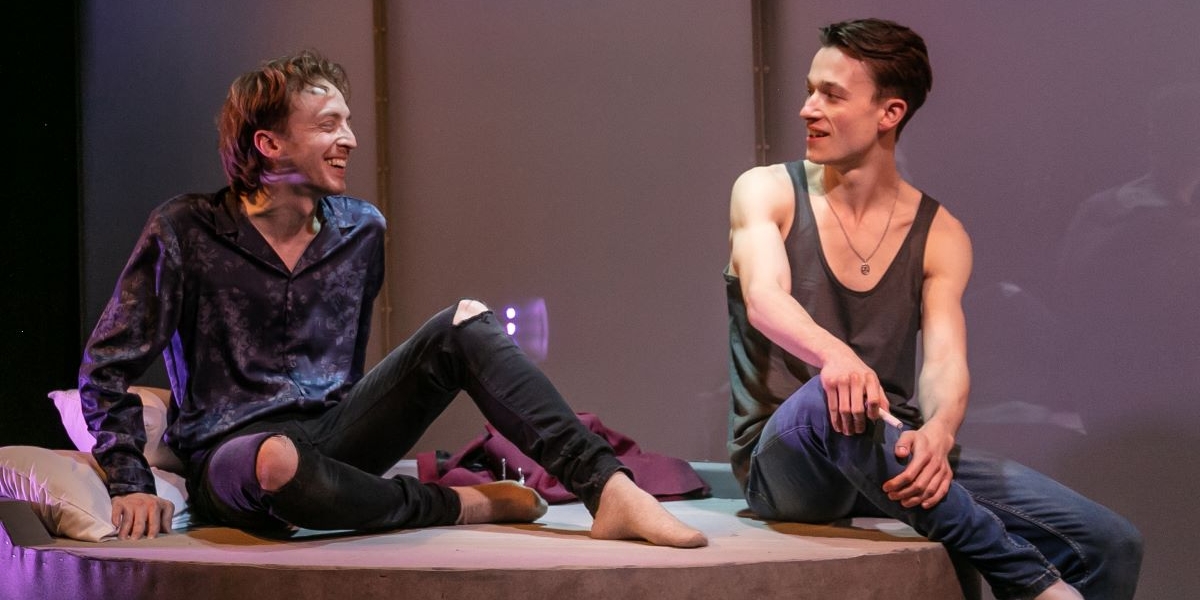You might well think from the confronting title and art work that goes with it that this play occupies a position at the shallower end of the dramatic pool, but you would be entirely wrong. Since its first appearance in 2009, ‘F**king Men’ has gone through many different casts, drafts and venues, becoming along the way a classic commentary on the changing shape of gay male relationships in our own era.
The core of its enduring success is Joe DiPietro’s brilliant adaptation of the original concept of Arthur Schnitzler’s ‘La Ronde’ (1897). Just as in the original, there are ten characters and ten scenes organised around a daisy-chain of couplings with one of the previous partners carrying the baton over to the next scene until we return to the beginning. But it goes deeper too, as the characters map over precisely from one format to another – a prostitute, a soldier, a writer, a married couple, an actor and so forth. Above all there is a shared economy of focus and means. Both authors are concerned to analyse our use and abuse of sex as central to our need for emotional and physical connection, and how that is refracted through social class and across generations. In conversations before or after or during intimacy big questions are explored but through dialogue both comic and intense that shows a deft and light touch.
On top of big issues such as homophobia, monogamy versus open relationships, porn and sex work, HIV, and the continuing challenge of the closet versus coming out, DiPietro is careful to update the text to include the most recent elements of gay dating: whether phone apps, Only Fans, PrEp, or the perils of sharing i-cloud with your partner. There are other ways too in which the production moves on from its predecessors, making it the most successful of those I have seen to date. Designer Carla Evans has created a marvellously minimalist set with a circular bed/divan in the foreground and a screen of rectangular glass panels behind which switch betwen clear and opaque. This creates wonderful dramatic opportunities for swift and meaningful transitions between scenes as the next character comes into view or another one appears in reminiscence or shadow or reveal. As a result of this decisive, simple effect what could be a pattern of fragmentation becomes a seamless continuity.
There are four actors, doubling up various roles. Each of the performers is outstanding in his own right but the personal and sexual synergy between them both plausible, raunchy and tender. The actors and intimacy coordinator deserve congratulations for nudity and sex scenes that are integrated quite naturally into the drama, avoiding gratuitous sensationalism. There is emotional intensity too, especially in the final, longer segments where the characters of the older journalist, Hollywood actor, and young hooker are all well established. Alex Britt finds remarkable brittleness, arrogance and vulnerability in the youngest roles; Charlie Condou, at the opposite end of the age spectrum, gives us a hard-bitten, closeted journalist and a vulnerable husband trying to connect with a younger man to compensate for his partner’s playing away from home. Stanton Plummer-Cambridge embodies a soldier unable to accept his sexuality, and in contrast a Hollywood actor determined to reconcile with his. A third role allows him to explore the bleak consequences of failing to define the boundaries of an open relationship. Derek Mitchell lends his considerable comedic talents to the parts of a teacher and a self-dramatising playwright, whose appearance is the laugh-aloud, over-the-top highlight of the evening (“If Joan Crawford couldn’t play it, I wouldn’t write it”).
A final element of the success of this show is the venue. The Waterloo East Theatre is an intimate space built under a railway arch, and though a train occasionally chunders overhead, this is a small price to pay for the focus and concentration that wraps around the audience, allowing for those moments of two-way interaction between public performance and private self-reflection and refraction that are the precious gift of the best theatre.

